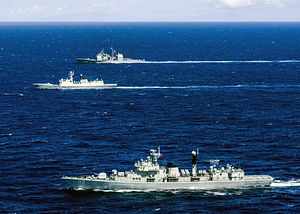The biennial Western Pacific Naval Symposium (WPNS) closed today in the Chinese port city of Qingdao. In his closing speech, Admiral Wu Shengli, the commander of the People’s Liberation Army Navy (PLAN), said that the event had met its goals of “broadening horizons, enhancing mutual understanding and deepening friendship.”
This year’s WNPS could also claim a more concrete success: the unanimous approval of a maritime communications agreement, the Code for Unplanned Encounters at Sea (CUES). Such a communications deal was proposed over 10 years ago. At the 2012 WPNS, held in Kuala Lumpur, China was the sole country to oppose CUES, citing dissatisfaction with the word “code” (implying legal force) in the title.
That objection has apparently been overcome, as Admiral Wu praised the “milestone document” as a means to develop better communication channels between navies. Other navy chiefs agreed. Admiral Harry Harris, Commander of the U.S. Pacific Fleet, called CUES “an important step forward to reduce tension on the sea in the region” and Japanese Maritime Self Defense Force chief Admiral Katsutoshi Kawano said he was “very happy” the code was approved.
CUES is a non-binding, voluntary agreement to follow certain set procedures for communicating with other military forces encountered at sea or in the air. Reuters, which has seen a draft of the text, called CUES “a handbook for maneuvers when naval ships and aircraft encounter each other unexpectedly.” Communication methods include the firing of different colored flares as well as using a list of English-language terms.
CUES is not meant to have any effect on the ongoing territorial disputes in the Western Pacific, but is “rather a much needed de-escalation mechanism,” Gary Li of IHS Maritime told Reuters. Chinese analysts also saw potential for the agreement to reduce tensions. Zhang Junshe of the PLA’s Naval Military Studies Research Institute told Xinhua that CUES will “effectively control maritime crises and help avoid incidents of interference and collisions in international waters.”
While CUES will help reduce the chance of miscommunication, it will not address the root cause of the tensions: territorial disputes and the resulting convergence of different naval fleets in the same maritime areas. In other words, CUES will not prevent maritime confrontations, but seeks to set some ground rules to prevent confrontations from escalating into conflict. One U.S. Navy Pacific Fleet official suggested CUES would not minimize the risk of an actual collision at sea. As he told Reuters, “If your intent is to cause trouble, you’re going to cause trouble no matter what.”
China has also made it clear that its support from CUES does not suggest any change in its position on its territorial claims. General Fan Changlong,a vice chairman of China’s Central Military Commission told other naval leaders, “No country should expect China to swallow the bitter pill of our sovereignty, national security or development interests being compromised.” However, even while maintaining a firm line of China’s territorial claims, Fan added that China will never “follow the path that some major countries took to pursue maritime hegemony and colonization of other countries, or exploitation of their resources.”
Admiral Wu also offered a potential olive branch in his closing remarks, as he underlined the need to “to resolve maritime disputes and conflicts through peaceful means as well as avoid extreme behavior that may endanger regional security and stability.”
In the spirit of the WPNS, China and Japan took a step forward to increase communication as their two top naval officials shared a brief chat on the sidelines of the symposium. A meeting between Chinese Admiral Wu and Japanese Admiral Kawano had been rumored for some time, but on Sunday China’s navy firmly denied that any such meeting would take place. Apparently, China was only referring to an official meeting between the two men, something Tokyo had apparently sought and been denied.
According to Kyodo News, Wu and Kawano spoke for about 15 minutes while the two men stood next to each other during the welcoming ceremony. While it’s hardly the setting for a ground-breaking moment, given the current state of China-Japan relations even this small sign of cooperation was taken as a good start. According to Kawano, both he and Wu “agreed on the importance of the code of behavior,” referring to CUES. Chinese media did not report on the Wu-Kawano meeting, preferring instead to highlight CUES and China’s separate holding of a joint maritime drill with Bangladesh, Pakistan, Singapore, Indonesia, India, Malaysia and Brunei.
Overall, there were no historic breakthroughs at WPNS, and none were expected. But there were small steps forward, including the agreement on CUES and brief conversation between Wu and Kawano, and in delicate situations such as the current territorial disputes progress can only be made incrementally.

































